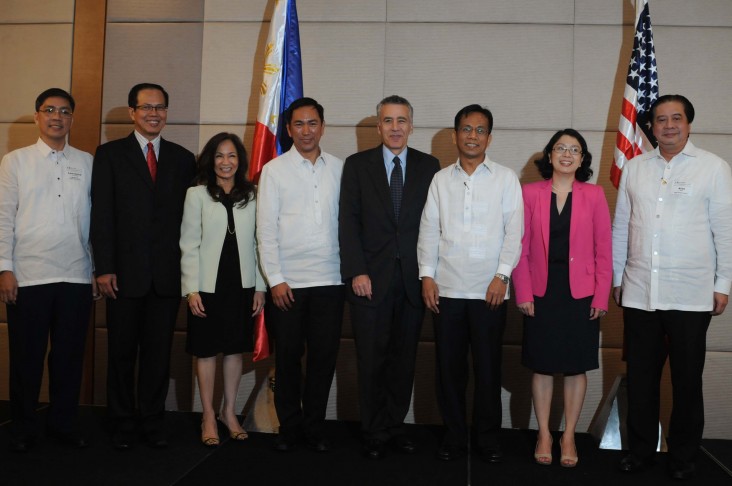
For Immediate Release
The Government of the Philippines (GPH) and the U.S. Government today launched a new program that will help the Philippines bring down the cost of power.
U.S. Ambassador to the Philippines, Philip S. Goldberg joined Secretary Arsenio M. Balisacan, Director-General, National Economic and Development Authority and Secretary Carlos Jericho L. Petilla, Department of Energy to launch the Energy Policy and Development Program (EPDP).
Funded by the U.S. Embassy Manila’s United States Agency for International Development (USAID) and implemented by UPecon Foundation, Inc., EPDP is a four-year, Php225 million ($5 million) project that aims to strengthen the GPH capacity to formulate evidence-based policies and strategies for the cost-effective use of energy resources towards environmentally-sound energy development.
“The Philippines has become one of the fastest-growing economies in Asia and represents new opportunities for trade and investment that create jobs. Crucial to this, businesses need stable supply and low cost power to be competitive while households need access to reliable and affordable electricity to be productive,” Ambassador Goldberg said. “This new partnership will help develop and promote knowledge, research and best practices in the energy sector that will be important to sustain the impressive growth achieved by the Philippines in the recent years.”
EPDP will work to promote an energy policy and reform agenda. It will operate as an independent think tank that guides and informs policy and decision-making, and provides inputs to establish an academic and policy program at the University of the Philippines. EPDP will also help inform private sector business strategies in ways that support sustainable economic development.
“The Philippine Development Plan Midterm Update 2011-2016 emphasizes the need for sustainable, reliable, and efficient use of energy resources, as well as the development of environment-friendly energy technologies. The EPDP can provide invaluable guidance to stakeholders in the energy sector and policymakers in government in the crucial years ahead,” NEDA Secretary Balisacan said.
Key to advancing EPDP’s research agenda, the program will assist the University of the Philippines School of Economics to develop institutional linkages with U.S. universities and institutions with expertise in the energy sector, to include: University of Hawaii, Tufts University, Massachusetts Institute of Technology, International Food Policy Research Institute, and University of California Energy Institute.
EPDP builds upon a long history of partnership between the United States and the Philippines, which was solidified under the bilateral Partnership for Growth (PFG). “The U.S. Government, through USAID will continue to support the Government of the Philippines’ efforts to reduce the high cost of electricity and promote access to affordable power,” said USAID Mission Director Gloria D. Steele.
Under the PFG, both governments are addressing the most serious constraints to inclusive growth in the Philippines. EPDP contributes to this by fostering a more competitive business environment for the country through sustained and affordable energy supplies.
About USAID
The United States Agency for International Development is the lead U.S. Government agency that works to end extreme global poverty and enable resilient, democratic societies to realize their potential. In the Philippines, USAID partners with the national government to create a more stable, prosperous and well-governed nation. For more information, visit http://www.usaid.gov/philippines or email infoph@usaid.gov.







Comment
Make a general inquiry or suggest an improvement.